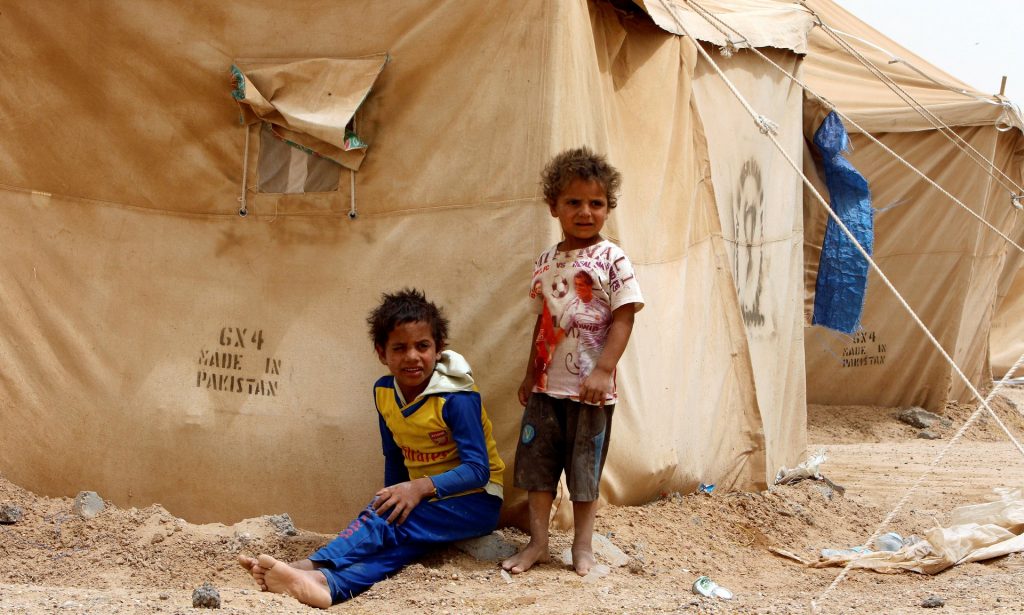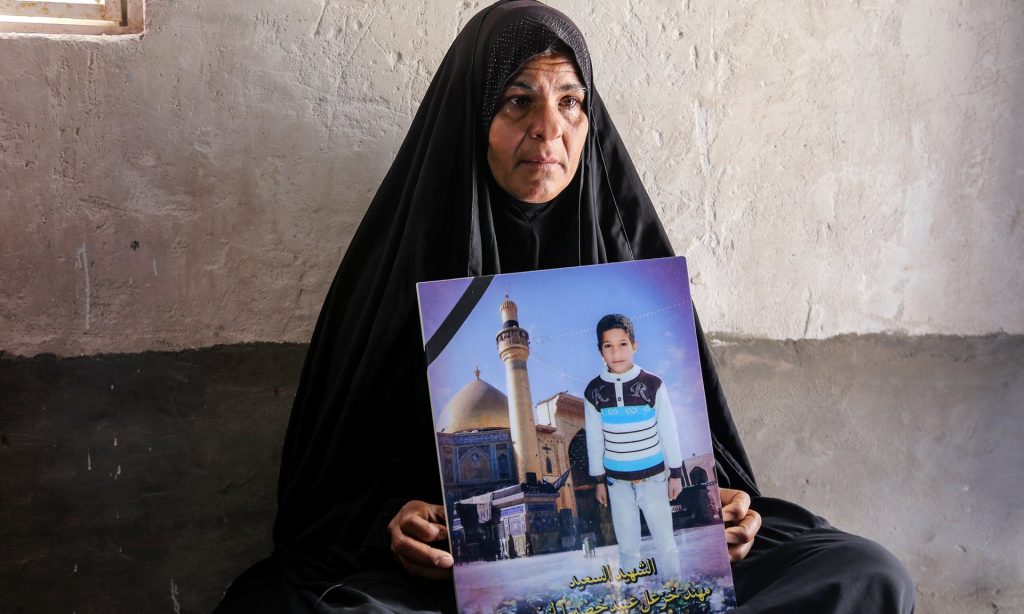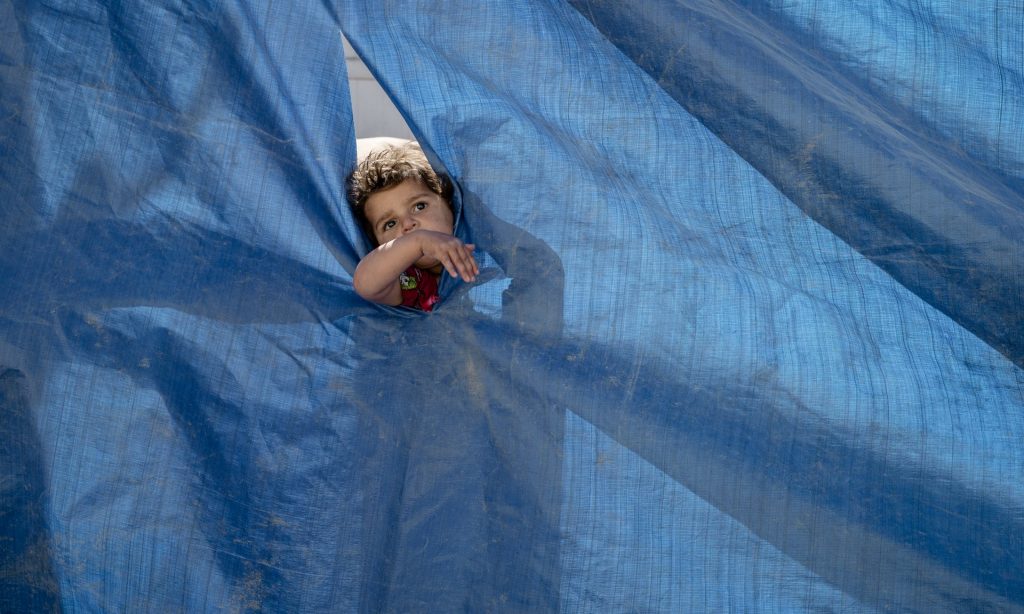
Photograph: Ahmed Saad/Reuters
One in every five children in Iraq is at serious risk of death, injury, sexual violence and recruitment into armed groups, while nearly 1,500 have been snatched from the streets or their homes since 2014, says a new report (pdf).
The UN children’s agency, Unicef, says 3.6 million children face this litany of risks – an increase of 1.3 million in 18 months. A third of all Iraqi children – 4.7 million – need humanitarian aid, with conditions only getting worse following fierce battles around the city of Falluja.
“Children in Iraq are in the firing line and are being repeatedly and relentlessly targeted,” says Peter Hawkins, the agency’s representative in Iraq.
“We appeal to all parties for restraint and to respect and protect children. We must help give children the support they need to recover from the horrors of war and contribute to a more peaceful and prosperous Iraq.”
The report says almost 10% of Iraq’s children – more than 1.5 million – have been forced to flee their homes since the intensification of fighting in 2014.
“The conflict is exposing children in Iraq to daily horrors. Unless addressed immediately, young minds, haunted by fear and hatred, could slip into a spiral of despair, darkness and a sense of helplessness. Learning, playing and aspiring to a more prosperous future will be a thing of the past.”
Last week, the United Nations warned that fighting against Islamic State – whose two main strongholds were Falluja and Mosul – could force up to 2.3 million people from their homes this year.

On Sunday, a senior Iraqi commander said Isis had been routed from Falluja after a month-long operation that forced tens of thousands of people to camps on the outskirts of the devastated city. More than 80,000 people are now short of food, water and shelter in these makeshift camps. The UN says it desperately needs more funds to help them – and potentially millions more as the fighting spreads.
The loose alliance of government forces, local fighters and Shia militias, backed by air power from the US-led coalition, plan to continue across the country and eventually move against Mosul.
Unicef says it has documented 838 child deaths since 2014, and 794 injuries, but it says the true number is probably much higher. It has also verified the abduction of 1,496 children – on average 50 every month – since the beginning of 2014.
“The kidnapping of children from their homes, their schools and from the streets is horrifying,” said Hawkins. “These children are being ripped from their families and are subjected to sickening abuses and exploitation.”
The report says abducted girls are most at risk of sexual abuse, particularly those from religious and ethnic communities.
“The use of sexual violence and the brutalisation of women and girls has been well documented, with many abducted on a mass scale, held captive for months, sold into sexual slavery and subjected to rape, torture and abuse. Boys are often forced into supporting front-line activities in the conflict, including as combatants or suicide bombers,” it says.

Photograph: Unicef/Yar
Unicef documents 124 cases of child recruitment since 2014, but again says the true number was probably much higher.
Another threat to children is thousands of mines, scattered across the country. The report says that in Diyala, east of Baghdad, security forces disarmed at least 18 explosives hidden in dolls along a route used by families fleeing the fighting.
Aside from ever-present physical danger, children are facing devastating psychological trauma with lifelong consequences, Unicef says.
“The glass doors in my house shattered in the bombings. I don’t like airplanes. They are loud and they make me scared. I think about it now and I cry a lot. Sometimes I can’t sleep. I want to stay beside my dad,” Wafiyah, 10, who was displaced from Baiji, north of Tikrit, told the report’s authors.
Because so many families have lost their livelihoods, more and more children are being sent to work, or get married early. Unicef says currently around 975,000 girls in Iraq are married before the age of 15 – twice as many as in 1990 – while 575,000 children are estimated to be working – again double the number in 1990.
Nearly one in five schools is out of use due to conflict and almost 3.5 million children of school-age are missing out on an education, it adds.
Unicef says attacks on schools and medical facilities must cease, while aid organisations must have unimpeded access to children, including those in areas not under government control. It also calls for civilians to be given safe passage, education services to be improved, and psychological support to be provided.
Money is already running out and this has led to cutbacks in life-saving support for children. Unicef is seeking $100m for its work in Iraq in 2016.
“The consequences of inaction today will be felt for years to come,” the report warns. “Today’s children of Iraq are the country’s future teachers, nurses, doctors, lawyers, labourers, farmers, scientists and technicians. A failure to protect and nurture these children now will result in social and economic costs down the road that will threaten the future of the country.”

